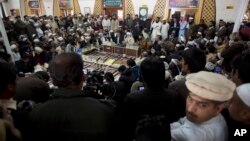ISLAMABAD —
A Taliban representative on Friday questioned a key term set out by the Pakistani government for negotiations with the militant group.
Negotiations to end years of violent militancy in Pakistan hit a hurdle just one day after talks began between the government and the Pakistani Taliban.
On Friday, a member of the three-man Taliban-appointed team of negotiators questioned a government condition that the talks be held within the parameters of Pakistan’s constitution.
Islamist leader Maulana Abdul Aziz said the Quran, not the constitution, was the only document that should be respected.
"The Taliban does not recognize the constitution, and you are insisting that the talks should be according to the constitution. You should say these talks should be according to the Quran, then matters can proceed. But when you put this condition it will delay the process,” he said.
The Tehreek-e-Taliban, an umbrella group of Islamist militants fighting the state of Pakistan, aims to bring its version of strict Islamist law to the country.
The Taliban itself did not issue any direct statement on the peace negotiations.
Information Minister Pervaiz Rashid said Friday the government was still committed to the peace process.
Previous attempts at ending the militancy through negotiation have failed.
A Pakistan counterterrorism expert at the Washington-based Institute for National Strategic Studies, Michael Kofman, believed these talks were headed the same way.
“I personally don’t think it can be very successful. The reason why I think that is that there is really no impetus for the Pakistan Taliban to negotiate with the government. They are technically on the winning end of the equation,” he said.
Kofman also felt there was little support for the talks from the powerful Pakistani military, which has taken considerable casualties in its fight against the militants.
Kofman said much could also depend on what kind of power the Afghan Taliban gathered in neighboring Afghanistan once the U.S. and international forces left that country at the end of 2014.
He said, “Now they are looking at the negotiations of Afghan Taliban with Kabul and they are saying let’s see what kind of deal the Afghan Taliban can get, because if the Afghan Taliban can get a good deal, then maybe that means maybe we are in a much better negotiating position with Islamabad, right?”
The Pakistani Taliban takes refuge in the mountainous border region between the two countries. Kofman says his opinions do not necessarily reflect those of his organization.
Negotiations to end years of violent militancy in Pakistan hit a hurdle just one day after talks began between the government and the Pakistani Taliban.
On Friday, a member of the three-man Taliban-appointed team of negotiators questioned a government condition that the talks be held within the parameters of Pakistan’s constitution.
Islamist leader Maulana Abdul Aziz said the Quran, not the constitution, was the only document that should be respected.
"The Taliban does not recognize the constitution, and you are insisting that the talks should be according to the constitution. You should say these talks should be according to the Quran, then matters can proceed. But when you put this condition it will delay the process,” he said.
The Tehreek-e-Taliban, an umbrella group of Islamist militants fighting the state of Pakistan, aims to bring its version of strict Islamist law to the country.
The Taliban itself did not issue any direct statement on the peace negotiations.
Information Minister Pervaiz Rashid said Friday the government was still committed to the peace process.
Previous attempts at ending the militancy through negotiation have failed.
A Pakistan counterterrorism expert at the Washington-based Institute for National Strategic Studies, Michael Kofman, believed these talks were headed the same way.
“I personally don’t think it can be very successful. The reason why I think that is that there is really no impetus for the Pakistan Taliban to negotiate with the government. They are technically on the winning end of the equation,” he said.
Kofman also felt there was little support for the talks from the powerful Pakistani military, which has taken considerable casualties in its fight against the militants.
Kofman said much could also depend on what kind of power the Afghan Taliban gathered in neighboring Afghanistan once the U.S. and international forces left that country at the end of 2014.
He said, “Now they are looking at the negotiations of Afghan Taliban with Kabul and they are saying let’s see what kind of deal the Afghan Taliban can get, because if the Afghan Taliban can get a good deal, then maybe that means maybe we are in a much better negotiating position with Islamabad, right?”
The Pakistani Taliban takes refuge in the mountainous border region between the two countries. Kofman says his opinions do not necessarily reflect those of his organization.





